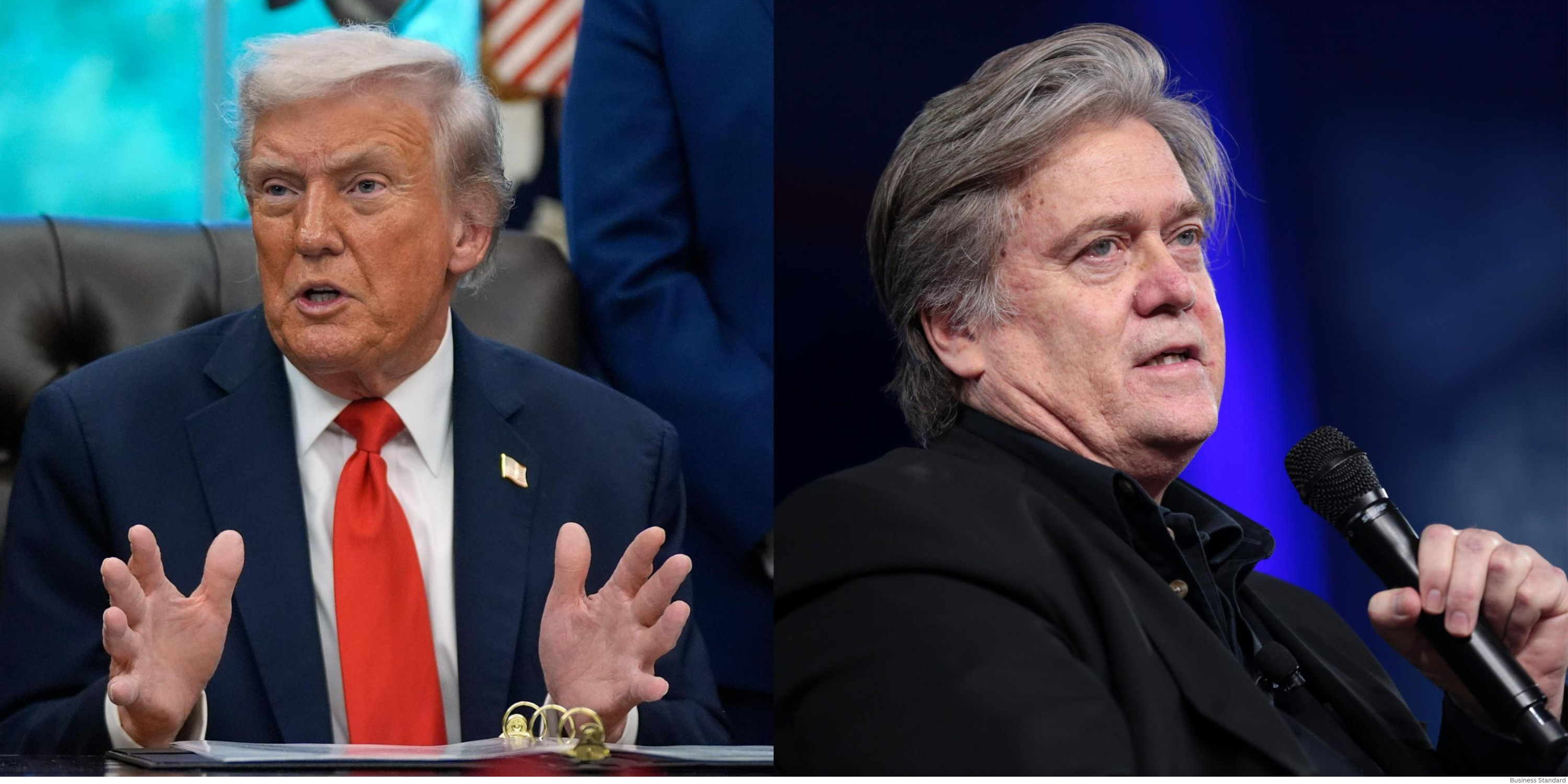WASHINGTON – Former West Wing aide and MAGA podcaster Steve Bannon has once again stoked political controversy by hinting at a plan for President Donald Trump to defy the Constitution and seek a third term in office in 2028. In an interview with The Economist on October 23, Bannon asserted, “Trump is going to be president in ’28, and people just ought to get accommodated with that.”
Though Bannon’s formal influence in the White House has waned since his tenure during Trump’s first administration, and notwithstanding his own legal troubles—including a four-month prison sentence last year and separate fraud charges to which he has pleaded guilty—he suggested there are “many different alternatives” to keeping his former boss in power.
“At the appropriate time, we’ll lay out what the plan is,” Bannon told the publication. “But there is a plan.”
Trump’s Longstanding Third-Term Speculation
Trump has publicly toyed with the notion of running again for years, even before the end of his second term in 2024. The idea has repeatedly surfaced at rallies, press conferences, and social media statements, despite the 22nd Amendment of the U.S. Constitution, which explicitly prohibits any individual from serving more than two four-year terms as president, whether consecutive or nonconsecutive.
During a White House reception in February, Trump addressed the audience directly, asking, “Should I run again? You tell me.” Such statements illustrate both his willingness to challenge political norms and the persistent attention he draws from supporters eager for his continued leadership.
The Trump Organization has capitalized on the speculation by selling “Trump 2028” hats, further fueling speculation and excitement among the president’s base, despite the clear constitutional limitations.
Legal Constraints and Constitutional Safeguards
The 22nd Amendment, ratified in 1951 following Franklin D. Roosevelt’s unprecedented four-term presidency, exists to prevent any individual from consolidating power indefinitely in the executive branch. Congressional Republicans have largely dismissed the notion of a third Trump term.
Senate Majority Leader John Thune (R-South Dakota) told reporters in March that Trump could not remain in the White House “without a change in the Constitution.” In a separate September interview with CNN, Thune added, “I think the Constitution speaks to that issue, and I think it's pretty plain,” characterizing efforts to suggest a third term as often expecting “a pretty light-hearted response.”
Trump himself has delivered inconsistent statements. In May, speaking to NBC News, he acknowledged the constitutional barrier, saying, “I will say this: So many people want me to do it. I have never had requests so strong as that. But it's something that, to the best of my knowledge, you're not allowed to do.”
Political and Electoral Implications
The idea of a potential third Trump term, constitutional limitations aside, has become a central talking point in national politics. For Democrats strategizing for the 2028 election, the suggestion that Trump might attempt to remain in office—even symbolically or through creative interpretations of the law—serves as a rallying point to energize their base.
Trump’s provocations on the issue reflect a broader pattern of testing the boundaries of executive authority. Analysts argue that these statements, regardless of their legal feasibility, serve to consolidate support among loyalists by portraying Trump as a figure willing to challenge institutional norms to “fight for the people.”
The suggestion of a third term has also led to public confusion and heightened partisanship. Conservative supporters often view the speculation as a potential political strategy, while opponents see it as a threat to democratic norms and constitutional governance.
Public Response and Media Attention
The media has amplified both Bannon’s and Trump’s statements, framing the discussion in a context of constitutional crisis, political theater, and the ongoing culture war in the United States. Public opinion remains deeply divided, with polls indicating that while a significant portion of Trump’s base supports his continued influence, the broader electorate views a third term as illegitimate and dangerous to democratic governance.
Political commentators have highlighted the tension between symbolic messaging and legal reality. While Trump and Bannon can promote ideas like “Trump 2028” as aspirational or rhetorical, the legal framework governing presidential elections remains unambiguous. Any serious attempt to pursue a third term would require a constitutional amendment, a process both politically and procedurally arduous.
Historical Context
No U.S. president has ever served more than two terms since the ratification of the 22nd Amendment. Franklin D. Roosevelt remains the historical exception, having served four terms from 1933 to 1945. The amendment was intentionally designed to prevent the concentration of executive power and to reinforce the democratic principle of regular, predictable leadership transitions.
Trump’s consideration of circumventing these restrictions, whether symbolic or procedural, underscores the tension between personal political ambition and constitutional safeguards. It also raises questions about how elected officials, political advisers, and legal institutions respond when rhetoric challenges long-standing democratic norms.
Looking Ahead
As the 2028 presidential election approaches, speculation about a third Trump term will likely continue to dominate media coverage, political discourse, and public debate. The discussion underscores broader themes of executive authority, constitutional fidelity, and the role of media in amplifying political narratives.
While legal experts, lawmakers, and historians emphasize the impossibility of a third term under current law, the ongoing rhetoric from Trump and his allies ensures that the topic remains a polarizing issue in American politics. Citizens, policymakers, and legal authorities alike will continue to monitor statements, actions, and potential strategies that could test the limits of constitutional governance.
Featured Post Suggestion:
%20(4).png)








